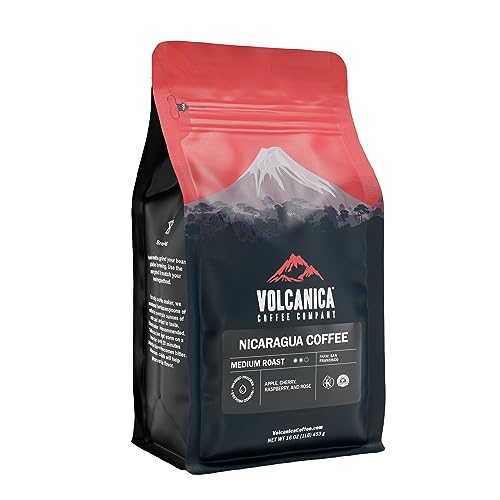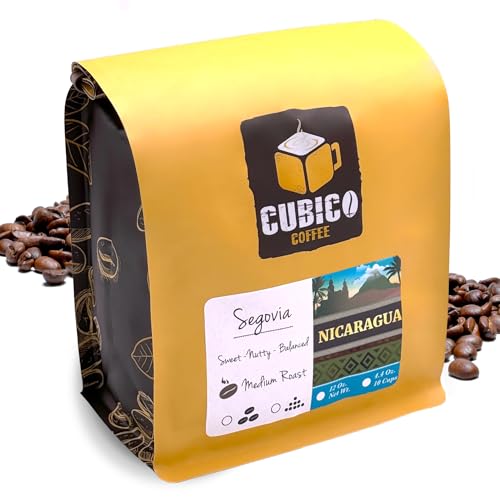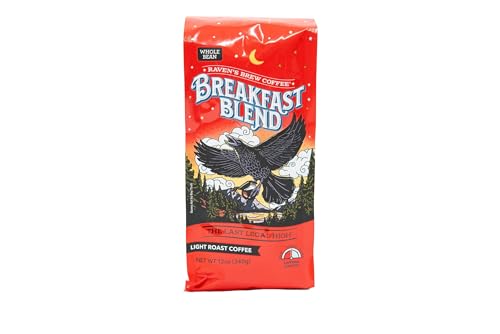Nicaragua’s coffee-growing regions, like Jinotega and Segovia, are renowned for producing beans with remarkable complexity and balance. The country’s rich volcanic soil, high altitudes, and dedicated farming practices yield a cup that often features a wonderful interplay of chocolatey richness and bright, fruity notes. For coffee enthusiasts seeking a new single-origin experience, Nicaraguan beans offer a consistently high-quality and satisfying profile.
Finding the right bag of beans can define your morning ritual. Whether you prefer a light, bright roast or a deep, smoky dark roast, our roundup of the best Nicaraguan coffee brands for 2025 is designed to guide you. We’ve curated a list that highlights exceptional quality, ethical sourcing, and the unique flavor characteristics that make Nicaraguan coffee a standout choice for your daily brew.
The Best Nicaraguan Coffee Beans & Brands For 2025
- Volcanica Nicaragua Coffee, Jinotega, Whole Bean
- Tiny Footprint Coffee – Fair Trade Organic Nicaragua Segovia Dark Roast
- Mayorga Organic Coffee Cafe Cubano Roast – Dark Roast Whole Bean
- Ruta Maya Organic Medium Roast Whole Bean Coffee 2 Count
- Cameron’s Coffee Roasted Whole Bean Coffee, Breakfast Blend
- Nicaraguan Coffee, Whole Bean, Premium Nicaragua Segovia Single Origin
- Raven’s Brew Coffee Light Roast Whole Bean – Breakfast Blend
- Stone Street Coffee Nicaraguan Reserve Whole Bean
- Cooper’s Cask Coffee Nicaraguan Dark Roast Whole Bean
Volcanica Nicaragua Coffee, Jinotega, Whole Bean

Volcanica’s offering from the Jinotega region is a medium roast that showcases a clean and balanced flavor profile. You can expect a great body with distinct notes of chocolate, lemon, plum, and subtle honey undertones, creating a complex and satisfying cup.
A significant benefit of this brand is its commitment to safety and quality. The beans undergo rigorous phytosanitary testing and lab analysis for mycotoxins and mold. They are then roasted at over 400°F, a process designed to guarantee a fresh and impurity-free coffee experience.
Tiny Footprint Coffee – Fair Trade Organic Nicaragua Segovia Dark Roast

For those who enjoy a bolder cup, this dark roast from Tiny Footprint Coffee delivers sultry, rich tones with a distinct chocolate roast character. It maintains traditional Nicaraguan flavors of bright apricot, fig, and spice, offering a deep yet nuanced taste.
This coffee is certified USDA Organic, Fair Trade, and Shade-Grown, ensuring environmentally conscious and ethical sourcing. Purchasing this coffee supports PRODECOOP, a cooperative that uses its proceeds to fund community programs in medical care, education, and sustainability. The brand is also carbon negative, making it an excellent choice for the eco-minded consumer.
Mayorga Organic Coffee Cafe Cubano Roast – Dark Roast Whole Bean

Mayorga’s Cafe Cubano Roast is an authentic Cuban-style dark roast blend perfected by their Roastmaster. This coffee features a rich, bold taste with hints of sweet vanilla and a syrupy smokiness, finishing smoothly with low acidity.
The beans are 100% organic Arabica, sourced directly from small partner farmers in Peru, Honduras, and Nicaragua. Mayorga employs a signature Latin slow-roasting technique in small batches to bring out the distinct aroma of each bean. Roasted and packaged fresh in the U.S., this specialty grade coffee is a firm customer favorite for its consistent quality and flavor.
Ruta Maya Organic Medium Roast Whole Bean Coffee

Ruta Maya offers a full-bodied medium roast that is both mellow and rich. It has mild acidity and a smooth flavor, leading to a soft, clean finish that is highly appreciated by coffee lovers seeking a well-rounded daily brew.
This coffee is made with 100% shade-grown Arabica beans from the highlands of Chiapas, Mexico, cultivated by a cooperative of Maya Indian farmers. It is USDA Certified Organic, meaning it is grown without the use of synthetic pesticides or chemicals, ensuring a pure and natural product.
Cameron’s Coffee Roasted Whole Bean Coffee, Breakfast Blend

Cameron’s Breakfast Blend is a mild yet rich combination of Central and South American coffees, slow-roasted for a flavorful start to the day. This blend is crafted to be smooth and full-flavored, making it a reliable and enjoyable choice for your morning cup.
The brand is committed to quality, selecting only the top 10% of Arabica coffee beans worldwide. Their coffee is sustainable, hand-crafted, and roasted in small batches to ensure it is never over-roasted, resulting in a smooth experience without bitterness.
Nicaraguan Coffee, Whole Bean, Premium Nicaragua Segovia Single Origin

This premium offering from Cubico Coffee features single-origin beans from the Segovia region of Nicaragua. The beans are handpicked and sun-dried, resulting in a rich and vibrant taste that reflects the unique terroir of its origin.
You can relish the aroma of this freshly roasted coffee, as each batch is carefully roasted to ensure a consistent flavor that enhances the bean’s natural notes. Its distinctive taste profile is a direct result of the specific climatic and geographical conditions of Nicaraguan coffee farms.
Raven’s Brew Coffee Light Roast Whole Bean – Breakfast Blend

Raven’s Brew Breakfast Blend is a light roast with a light body and notes of toffee and citrus. This blend is described as particularly brisk and wakeful, with a slight, refreshing acidity that makes it an ideal choice for morning brewing.
The coffee is packaged for maximum freshness in air-tight bags with one-way valves shortly after roasting. This process protects the beans from light and air, which are major contributors to staleness. Raven’s Brew selects rare, high-quality beans and roasts them to create super smooth layers of flavor without unpleasant acidity.
Stone Street Coffee Nicaraguan Reserve Whole Bean
Stone Street Coffee offers a Nicaraguan Reserve that highlights the quality of beans from this Central American nation. As a specialty coffee roaster, they focus on bringing out the unique characteristics of single-origin beans through their precise roasting process.
This whole bean coffee is designed for those who appreciate a true-to-origin flavor. You can expect a cup that reflects the careful cultivation and processing methods used by Nicaraguan farmers, resulting in a clean and distinct coffee experience.
Cooper’s Cask Coffee Nicaraguan Dark Roast Whole Bean
Cooper’s Cask Coffee provides a Nicaraguan Dark Roast for those who prefer a deep, robust cup. Their roasting style is developed to create a bold flavor profile that maintains the inherent qualities of the Nicaraguan beans while adding a rich, dark roast character.
This whole bean coffee allows you to grind it fresh at home, ensuring you get the most flavor and aroma out of every batch. It’s a solid choice for drinkers who enjoy a strong, classic dark roast coffee with the distinctive backbone of Nicaraguan Arabica beans.
Buying Guide: How to Choose Your Nicaraguan Coffee
When I look for the best Nicaraguan coffee beans & brands for 2025, I focus on a few key things that make this country’s coffee so special. Nicaragua’s diverse microclimates and volcanic soil create a fantastic foundation for complex beans, but knowing what to look for helps me find a bag I will really enjoy.
First, I always check the region. Nicaraguan coffee is known for its distinct regional profiles. Jinotega often produces beans with bright, crisp acidity and clean, winey notes. Matagalpa coffees tend to be a bit fuller-bodied with chocolatey undertones. Nueva Segovia is famous for its high-grown, dense beans that can have incredible sweetness and complex fruit or citrus flavors. If I see a region listed on the bag, it gives me a great clue about what to expect in the cup.
Next, I look at the roast level. This is a personal preference, but it dramatically changes the flavor. A light roast will highlight the bean’s origin characteristics—think floral, fruity, or tea-like notes. A medium roast brings more balance, often introducing nutty or caramel sweetness while preserving some acidity. A dark roast will lean into bolder, richer flavors like dark chocolate and spice, but it can overshadow the unique terroir of the bean. For most high-quality Nicaraguan beans, I prefer a light to medium roast to appreciate their inherent complexity.
I also pay close attention to the processing method. Washed (or wet-processed) coffees are common in Nicaragua and result in a clean, bright cup with a defined acidity. Natural (or dry-processed) beans, where the coffee cherry dries around the seed, often yield a much fruitier, sweeter, and heavier-bodied brew. Honey-processed is a middle ground, offering a syrupy body and muted acidity. This single factor can make the same bean from the same farm taste completely different.
Finally, I consider the roast date. Freshness is non-negotiable for a great cup. I look for bags with a “roasted on” date, not just a “best by” date. Ideally, I will brew the coffee between one to four weeks after that roast date. This gives the beans time to degas but ensures I am tasting them at their peak. Buying from roasters who are transparent about their sourcing and roast dates is my best strategy for finding a coffee I will love.
FAQ
What makes Nicaraguan coffee unique?
Nicaraguan coffee stands out because of the country’s ideal growing conditions. Many farms are situated on volcanic soil in high-altitude regions, which slows the bean’s maturation and leads to a denser, more flavorful seed. The combination of this rich soil, consistent rainfall, and shade-growing practices often results in a cup that is well-balanced, with a clean finish and notes that can range from chocolate and nuts to bright citrus and stone fruits. It is this consistent quality and approachable complexity that makes it a favorite.
Is Nicaraguan coffee strong?
This depends on your definition of “strong.” If you mean high in caffeine, Nicaraguan coffee is comparable to other Arabica beans from Central America. If you mean bold and bitter in flavor, that is more a result of the roast level than the origin itself. Many traditional Nicaraguan coffees are medium-roasted, offering a smooth, balanced strength without intense bitterness. However, you can certainly find dark roast options that provide a more powerful, robust taste profile.
What is the best grind size for brewing Nicaraguan coffee?
The best grind size depends entirely on your brewing method, not necessarily the coffee’s origin. For a pour-over or drip machine, a medium grind similar to sea salt is perfect for extracting those nuanced flavors. If you are using a French press, you will want a coarse grind to avoid sediment. For espresso, you need a fine, powder-like grind. I always recommend buying whole beans and grinding them right before you brew to get the freshest taste possible from your bag of the best Nicaraguan coffee beans & brands for 2025.
How should I store my coffee beans?
To keep your beans fresh, store them in an airtight container at room temperature. Keep them away from light, heat, and moisture. I use a simple ceramic canister with a rubber seal in a cool, dark cupboard. Do not store your coffee in the fridge or freezer, as the condensation that forms when you take them out can degrade the quality and flavor. It is best to buy smaller amounts more frequently so you can always enjoy your coffee at its peak.
Are there any certifications I should look for?
Certifications can tell you a story about how the coffee was grown. Organic certification means the beans were grown without synthetic pesticides or fertilizers. Fair Trade certification focuses on ensuring farmers receive a fair price and work under good conditions. Bird-Friendly or Rainforest Alliance certifications often indicate shade-growing practices, which are better for the ecosystem. While a certification is not a absolute guarantee of quality, it can align your purchase with your personal values.
